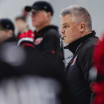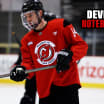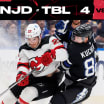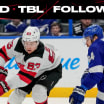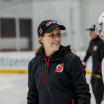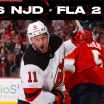This week on the Speak of the Devils Podcast, the curtain is pulled back on the development side of the New Jersey Devils. In the first of two development-centered podcasts, Development Coaches Eric Weinrich and Patrick Rissmiller give fans an in-depth look at their experiences behind the scenes in shaping the next generation of the Devils.
Their roles aren't simply for on-ice advice and work, but in fact, one of their most important roles is being an intermediary between player and club, and a constant outlet and mentor when needed.
There's no better example than the fall of 2018.
PODCAST: Development Coaches Pull Back the Curtain
Development Coaches Eric Weinrich and Patrick Rissmiller join the Speak of the Devils Podcast
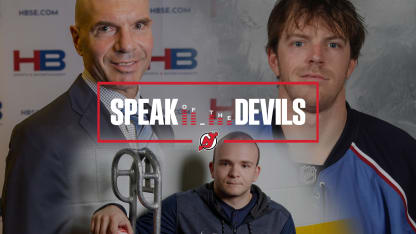
PAST DEVILS PODCASTS
SPEAK OF THE DEVILS PODCAST
Kevin Bahl discusses preparing for the NHL
Ken Daneyko discusses adjusting to his new routine
Taylor and Rogalski Discuss New Coaching Roles with Devils
Bobby Holik Shares Lessons Learned from Hockey
Lovejoy and Stafford Reflect on Retirements
Corey Pronman Breaks Down Devils Draft Picks
Hear from some of the newest additions to the Devils franchise
Holtz and Mercer discuss being drafted by New Jersey
Kevin Smith and Martin Brodeur Chat Draft Party
Sam Cosentino Discusses Draft
Larry Robinson reflects on time with Devils
David Gould Discusses His new HBSE Role
Chris Peters previews the draft
Recchi Joins the Devils Organization
John Madden discusses life after retirement
Special broadcasters episode
Walsh and Smith talk development and more
NHL's Davis and Scott discuss social justice and HBSE
TSN's Craig Button discusses 2020 NHL Draft propsects
Weinrich shared a story providing an inside look at how development coaches are called upon behind the scenes.
Just drafted, Ty Smith came into his first training camp and impressed right from the get-go. There was excitement from everyone, but at the end of the day, the decision was made to send Smith back to his WHL team in Spokane. A move to benefit his long-term development.
The whole thing was caught on tape. The disappointment was visible.
In steps a development coach. Weinrich, a former NHL defenseman who played over 1000 games, works mostly with the defensemen in the Devils system.
"I think I had about 10 trips in the first two months after Ty went back to Spokane," Weinrich recalled, "I don't know how much of a role I played in what happened after that, but I think as a player in that situation, if that was me, having that kind of support from the team that drafted you, especially he was a high pick, and he has a lot of expectations on himself. I know Ty was really disappointed, but he went back and handled it like a professional."
It's the small details of the Development Coach role that both Weinrich and Rissmiller share with the podcast's audience and the type of influence they hope they're having on the players.
"[Ty] had a fantastic year," Weinrich continued, "it was probably a great step in his development. But I know I would have liked to have somebody from the organization around and just show that we cared about what was going on and in his situation. And as a result, Ty and I have a great relationship now. And he reaches out to me every once in a while, and I keep in touch with him. And so, I think it's a mutual thing now, and I guess that's what you're always working towards."
Those relationships formed are relatively new, development staff's part of NHL teams have been expanding over the last 10 years or so. So, when Weinrich and Rissmiller were carving their way through the hockey world, Rissmiller a veteran of 554 AHL games and another 192 in the NHL, they did not have the same type of system set up by teams but did have people in their lives who helped them along the way. They're returning that favor now.
"It's like the idea of the fact that people helped me in my path, in my career," Rissmiller shared, "and there wasn't as much of the player development around, but there are always people there to help you out and guide you a little bit. And I think some of the guys appreciate that, you know need a little bit of feedback. And it's not just [being drafted] and then silence until they show up for camp. But now they have a little bit of an intermediary between the team and being drafted and trying to help them to where they want to go. So, it's been a lot of fun. I really enjoy it."
Weinrich and Rissmiller are part of the team that helps develop every year's Development Camp, held shortly after each draft. While this year was different and they were unable to hold one, each year they are at the forefront of planning out the week-long experience.
"You're not really making a team out of [camp]," Rissmiller said, "But you can always make a good first impression with everybody. You know, 'The equipment guys, let's pick up after ourselves' just the little, whatever we can have them pick up, the sooner they do it, the better. Whether it's cleaning up after yourself or what goes on on the ice and Eric or I do. I think it's a good jump-start."
The point is to really let these players get a taste of what it means to be a New Jersey Devil, what is expected of them, and share in the excitement of having them a part of the club.
In this week's community section of the Speak of the Devils podcast, host Catherine Bogart interviews U.S. National Sled Hockey Team Captain Josh Pauls. This is part two of a series of interviews highlighting sled hockey and celebrating International Day of Persons with Disabilities earlier this month.
Pauls, who helped inspire his teammate Jack Wallace's career, discusses the story from his point of view, starting with when the two met at a meet and greet following Pauls's first Paralympic Gold Medal in 2010.
"Being able to show everybody and say 'hey this is what hard work gets you.' And to meet Jack and show him the medal...He's such a force and to play that small part in his career, and just give him a little bit of a spark. He was going to make the National Team whether I came back with a gold medal or not, but for him I think it was a nice moment to say hey, this is what hard work can get you."
Pauls, a three-time Paralympic Gold Medalist and now Captain of the U.S. team knows the importance of using his platform to inspire and educate others. For him it's a role he doesn't take lightly.
"You don't know what's possible unless you can see that in someone else. I wan tot be an athlete and I want to show people that just because you have a disability doesn't mean there's not a way to play your favorite sport. Representation is huge and the more we can get of that, the better. But, even just having more people exposed to the sport, I think is great because I've never met anybody that's watched a sled hockey game and went 'oh that's alright.' They're always hooked."






